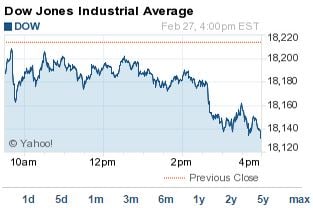The DJIA index dropped 82 points Friday. The cause? Mixed economic data, including a downward revision of fourth-quarter GDP.
Despite today's decline, the DJIA index had its best monthly gain since January 2013. Monthly gains were 5.5% for the S&P 500 - the biggest since October 2011 - and 7.1% for the Nasdaq, the biggest since January 2012.
 Today's Scorecard:
Today's Scorecard:
Dow: 18,132.38, -82.04, -0.45%
S&P 500: 2,104.49, -6.25, -0.30%
Nasdaq: 4,963.53, -24.36, -0.49%
What Moved the DJIA Index Today: Mixed economic data gave investors little enthusiasm to push stocks higher Friday. This morning, the second revision of the Q4 2014 GDP registered at 2.2%, which beat expected growth of 2.1%. Still, the figure slipped from the previous estimate of 2.6%, and the pace is a steep decline from the Q3 2014 final reading of 5%.
Meanwhile, the February reading of the Chicago PMI, an index of business activity in the U.S. Midwest, slipped to its lowest level since July 2009.
[epom key="ddec3ef33420ef7c9964a4695c349764" redirect="" sourceid="" imported="false"]Now, check out the other top market stories - plus get our new profit tip for investors:
- Earnings Blowout: Shares of Monster Beverage Corp. (Nasdaq: MNST) jumped 13.4% to hit an all-time high today after the company reported a huge earnings beat for the fourth quarter. Quarterly profit surged 65% to $125.3 million. That was well ahead of consensus estimates of $101.5 million. Shares of the Coca-Cola Co. (NYSE: KO), which owns a 16.7% stake in Monster, were up nearly 2% on the day.
- Oil Posts Monthly Win: Crude oil prices posted their first monthly gains in February since June. Brent crude, priced in London, increased roughly 18.1% for the month, while April 2015 futures for U.S. crude, priced at the NYMEX in New York City, added 3.2% for the month. Domestic crude continues to lag against Brent due to rising inventories and oversupply concerns. The S&P 500 Energy Index was up 0.2% Friday, but energy giants Exxon Mobil Corp. (NYSE: XOM), Chevron Corp. (NYSE: CVX), and ConocoPhillips (NYSE: COP) were down on the day.
- Net Neutrality Ruling: Investors are still uncertain how to react to yesterday's decision by the Federal Communications Commission (FCC) to pass net neutrality regulations. Under the plan, regulators will prohibit Internet service providers from "discriminating" against a particular online service or website. The only thing certain is that lawsuits are pending, as companies argue that the FCC does not have the unilateral authority to impose the rules. Lawyers are suiting up at Comcast Corp. (Nasdaq: CMCSA), AT&T (NYSE: T), Verizon Communications Inc. (NYSE: VZ), and Time Warner Cable Inc. (NYSE: TWC).
- Departures: Shares of Bank of America Corp. (NYSE: BAC) slipped more than 1.4% on news that its chief accounting officer and two board directors will be departing from the banking giant in March. Meanwhile, shares of Potbelly Corp. (Nasdaq: PBPB) cratered more than 8.5% after the company announced the resignation of CFO Charlie Talbot. The company received a downgrade from a Piper Jaffray analyst, who called Talbot the glue of the organization.
- An Apple a Day: Shares of Apple Inc.(Nasdaq: AAPL) fell 1.5% today on news that Ericsson sued the tech giant over 41 alleged cases of patent infringement. The specified patents are central to the functionality of Apple devices, including the popular iPhone. The company has also sent invitations to an event on March 9, telling participants to "Spring Forward." The event, which coincides with the start of Daylight Savings Time, is one month before the company plans to launch the Apple Watch.
Money Morning Tip of the Day: High-margin specialty drugs, and specifically drugs used to treat hepatitis C, offer one of the best profit opportunities right now in the pharmaceutical market.
High-margin specialty drugs are prescription medications that treat complex, chronic, and debilitating diseases. They're very expensive - as much as hundreds of thousands of dollars.
The market for these medications will quadruple over the next five years. Consumer spending on these drugs hit $87.1 billion in 2012. In five years that number will soar to $401.7 billion.
Some of the priciest high-margin specialty drugs include Soliris, developed by Alexion Pharmaceuticals, and Elaprase, by Shire. Soliris treats a rare blood disorder and costs patients roughly $410,000 per year. Elaprase treats Hunter syndrome and costs $375,000 per year.
Those hefty price tags have caused these drug makers' stocks to surge. Since 2010, Alexion has gained 625%, and Shire 275%.
The biggest profit play of all in high-margin specialty drugs comes from makers of hepatitis C treatments. An April 2014 report from Express Scripts found that spending on hepatitis C drugs is expected to increase by more than 200% in both 2015 and 2016.
Newer and more convenient treatments in the coming years will drive sales. And the high price of these hepatitis C drugs will propel the stocks of the pharmaceutical companies that make them to new heights.
Get the best stock pick to play this trend right now, here: "These Pharmaceutical Stocks Let You Tap into a $402 Billion Trend."
About the Author
Garrett Baldwin is a globally recognized research economist, financial writer, consultant, and political risk analyst with decades of trading experience and degrees in economics, cybersecurity, and business from Johns Hopkins, Purdue, Indiana University, and Northwestern.



